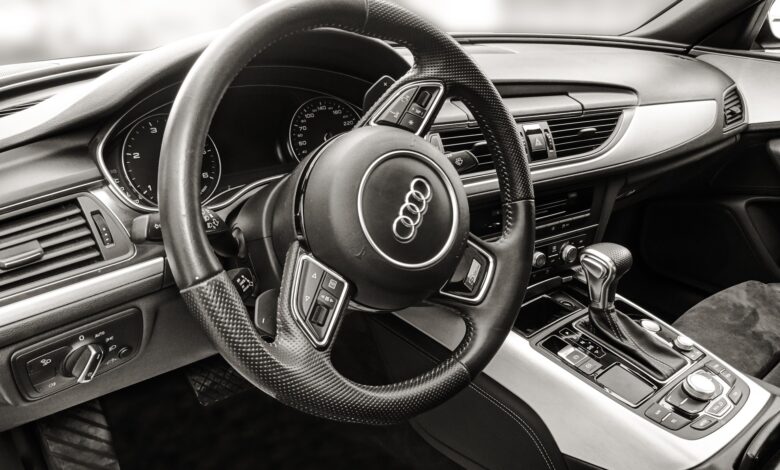The Ultimate Guide to Replacing Your Audi Brake Pads

Maintaining Audi brake pads is crucial for the safety of both the driver and passengers. Properly functioning brake pads ensure efficient braking, reducing the risk of accidents and ensuring optimal performance of the vehicle. Neglecting regular maintenance can lead to decreased brake performance, increased stopping distances, and potential damage to other components of the braking system. It is essential to regularly check and replace worn-out brake pads to ensure the safety and performance of your Audi. Trusting professionals, such as Al Kaser Garage, experienced in Audi brake pad replacements, can guarantee a job well done and peace of mind on the road.
Why Audi Brake Pads are crucial for safety
Audi Brake Pads play a vital role in the safety of the vehicle as they provide the necessary friction to stop the car efficiently. Worn-out brake pads can compromise the braking system, leading to longer stopping distances and increased risk of accidents. Regular maintenance and replacement of brake pads ensure optimal safety on the road.
Signs that indicate Audi Brake Pads need replacement
Signs that indicate Audi Brake Pads need replacement include squeaking or grinding noises, reduced braking performance, longer stopping distances, and vibration or pulsation in the brake pedal. It is crucial to address these signs promptly to ensure safety on the road. Trust the expertise of professionals at Al Kaser Garage for timely brake pad replacements.
Choosing the Right Brake Pads for Your Audi
Choosing the right brake pads for your Audi is essential to ensure optimal safety and performance. Factors to consider include the type of driving you do, the climate you live in, and your budget. Consult with a professional at Al Kaser Garage to find the perfect brake pads for your Audi.
Factors to consider when selecting Audi Brake Pads
When selecting Audi brake pads, it is important to consider factors such as driving style, climate, and budget. High-performance driving may require more aggressive brake pads, while colder climates may require pads with better cold weather performance. Additionally, considering your budget is important as different types of brake pads come at different price points.
Different types of brake pads available for Audis
When it comes to replacing brake pads for your Audi, there are several options to choose from. Some of the most common types include ceramic brake pads, metallic brake pads, and organic brake pads. Each type has its own advantages and characteristics that cater to different driving styles and preferences.
Ceramic brake pads are known for their durability and excellent performance in high temperatures. They produce less dust and offer a quieter and smoother braking experience. Metallic brake pads, on the other hand, are made with a combination of metals such as copper, steel, or iron. These pads provide superior stopping power and are ideal for heavy-duty and performance-oriented driving.
DIY vs Professional Replacement of Audi Brake Pads
When it comes to replacing brake pads on your Audi, you have the option of doing it yourself or seeking professional help. DIY replacement can save you money, but it requires proper knowledge and tools. However, having a professional replace your Audi brake pads ensures expertise and guarantees a job well done.
Pros and cons of replacing Audi Brake Pads yourself
Replacing Audi brake pads yourself can save you money and give you a sense of accomplishment. However, if you lack knowledge or experience, you may make mistakes that could lead to improper installation or damage to your vehicle.
Benefits of getting Audi Brake Pads replaced by a professional
Getting Audi Brake Pads replaced by a professional brings several benefits. They have the expertise and knowledge to ensure proper installation, reducing the risk of mistakes. Professionals also have access to high-quality brake pads and can recommend the best option for your Audi. Additionally, they can identify any other potential issues or needed repairs while inspecting the brake system, providing a comprehensive solution for optimal safety and performance. Trusting a professional ensures peace of mind and maximizes the longevity and reliability of your Audi’s brake system.
Steps to Replace Audi Brake Pads
Replacing Audi brake pads involves a series of steps that should be followed carefully. First, park the car on a level surface and secure it with wheel chocks. Then, remove the wheel and locate the brake caliper. Use a wrench to remove the caliper bolts and carefully lift the caliper off the brake rotor. Next, remove the old brake pads from the caliper bracket and replace them with the new ones. Use a C-clamp to compress the caliper piston and make sure it is fully retracted. Finally, reassemble the caliper, put the wheel back on, and repeat the process for the other wheels. Always remember to consult the vehicle’s manual and use proper safety precautions while performing any maintenance or repairs.
Maintaining Optimal Performance After Brake Pad Replacement
After replacing your Audi brake pads, it is essential to follow proper maintenance to ensure optimal performance. Be sure to break in the new pads by gradually increasing braking force. Additionally, regular inspections and timely replacement of other brake components, such as rotors and calipers, will help maintain performance and safety. Remember to adhere to the recommended maintenance schedule provided by your Audi dealership or trusted car repair service, like Al Kaser Garage in Dubai. This will guarantee that your Audi continues to perform at its best even after brake pad replacement.
Conclusion
In conclusion, maintaining and replacing your Audi brake pads is crucial for ensuring safety and optimal performance. Whether you choose to replace them yourself or seek professional help from a trusted Audi repairing service like Al Kaser Garage in Dubai, regular maintenance and attention to your brake pads will provide longevity and peace of mind on the road.





